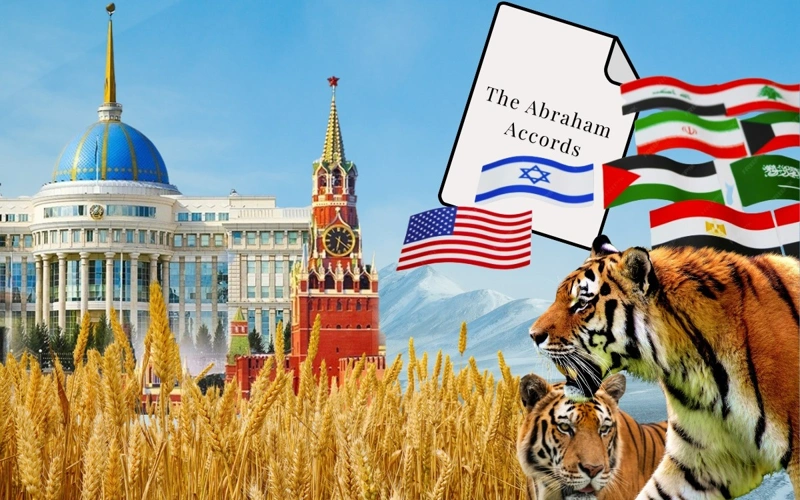Foreign media on Kazakhstan: Why Kazakhstan’s joining Abraham Accords matters; Kazakhstan, Russia ink comprehensive strategic partnership declaration
Based on recent developments, including Kazakhstan’s decision to join the Abraham Accords, the signing of a comprehensive strategic partnership declaration with Russia, and Russia’s contribution of Amur tigers to support Kazakhstan’s tiger restoration efforts, Kazinform News Agency presents a weekly review of the country’s coverage in foreign media.

Washington Examiner: Why Kazakhstan’s joining the Abraham Accords matters
Kazakhstan’s decision to join the Abraham Accords may seem symbolic, given its three decades of diplomatic ties with Israel, Washington Examiner reports. Yet the move carries strategic weight. The accords, launched in 2020, unite Israel with Muslim-majority states to deepen regional cooperation and counter longstanding hostility. By joining, resource-rich Kazakhstan strengthens a pro-West, pro-Israel arc stretching across the Middle East and Central Asia, indirectly tightening Iran’s strategic containment.
Although Astana maintains strong economic ties with Tehran, including oil swap arrangements, its entry into the accords signals a clearer alignment with the West. The move could also encourage Uzbekistan and Azerbaijan to follow.
Kazakhstan is taking this step despite widespread criticism of Israel’s actions in Gaza, underscoring that Israel is not diplomatically isolated. Above all, Astana’s accession reflects the expanding power of the Abraham Accords and the weakening of Iran’s regional posture.
The Times of Central Asia: Kazakhstan, Russia sign comprehensive strategic partnership declaration
Kazakh President Kassym-Jomart Tokayev and Russian President Vladimir Putin signed a declaration in Moscow on November 12, 2025, raising bilateral ties to a “Comprehensive Strategic Partnership and Alliance,” The Times of Central Asia reports. Tokayev wrote ahead of the visit that the document “will open a new era in bilateral relations,” while Putin called Kazakhstan one of Russia’s closest allies and said the agreement “outlines measures to enhance regional partnerships and border cooperation.”
The leaders emphasized expanding economic and energy cooperation. Tokayev noted that trade had reached nearly $30 billion in 2024, and both sides discussed increasing Russian gas supplies, advancing the Rosatom-built nuclear power plant, and ensuring the uninterrupted operation of the Caspian Pipeline Consortium. Tokayev also highlighted new Russian university branches in Kazakhstan as evidence that cooperation extends beyond energy.
Tokayev framed the alliance as part of a longstanding partnership, stating that “despite the complex international situation, interaction and cooperation are actively developing.” Yet the agreement fits within Kazakhstan’s broader multi-vector strategy. Days before arriving in Moscow, Tokayev attended a C5+1 summit with U.S. President Donald Trump, and earlier in 2025 he deepened ties with China during Xi Jinping’s visit to Astana.
For Astana, the declaration reinforces one pillar of its balanced foreign policy without compromising engagement with other major powers.
APK Inform: Kazakhstan’s wheat stocks reached an all-time record of 20 million tons
As of November 1, Kazakhstan had about 20 million tons of wheat in stock - an absolute record for at least the past 12 years (18.8 million tons on the same date in 2024 and 13.1 million tons in 2023), APK-Inform reports, citing official statistics.
At the beginning of November 2025, stocks of food wheat in the country amounted to 18 million tons, seed wheat - 1.02 million tons, and feed wheat - about 947.000 tons. The volume of durum wheat available as of that date was about 1.14 million tons, including 1.03 million tons of food-grade wheat.
As of November 1, 2025, barley stocks in Kazakhstan were slightly below last year’s level - 2.95 million tons (compared with 2.97 million tons in 2024).
Corn stocks amounted to 438.5 thousand tons (versus 362.000 tons a year earlier), oats - about 297.000 tons (299.000 tons), while buckwheat stocks were lower – 94.000 tons compared with 111.000 tons on the same date in 2024.
Overall, as of November 1 of this year, Kazakhstan had 25.04 million tons of grains and legumes (including rice) in stock, compared with 23.4 million tons on November 1, 2024.
The Times Central Asia: Russia’s Amur tigers to aid restoration of tiger population in Kazakhstan
According to The Times of Central Asia, Kazakhstan and Russia have signed a formal action plan to reintroduce Amur tigers to Kazakhstan, advancing efforts to restore the long-extinct Turan tiger. On November 12, the two countries agreed to transfer four Amur tigers—two males and two females—to the Ile-Balkhash State Nature Reserve, where they will adapt to local ecological conditions.
Kazakhstan’s Ecology Ministry emphasized that the project is scientifically grounded: the extinct Turan tiger once ranged across Central Asia, and biologists note that Turan and Amur tigers share “the same genetic lineage,” making Amur tigers suitable for reintroduction.
Under the agreement, Russia will oversee transportation and veterinary care, while Kazakhstan will manage the animals’ accommodation and monitoring. WWF and UNDP are supporting the initiative. The plan builds on the 2024 transfer of two Amur tigers from the Netherlands, now held in a breeding enclosure with the aim of eventually releasing their offspring into the wild—the first wild tigers in Kazakhstan in more than 70 years.
The Ile-Balkhash Reserve, located in the Ili River delta, was chosen for its intact floodplain ecosystems and efforts to restore prey species, whose historical decline contributed to the Turan tiger’s disappearance by 1948.
Travel and Tour World: Greece & Kazakhstan affirm tourism cooperation as Air Astana routes re‑established, supporting airline growth & hospitality sector prospects
Greece and Kazakhstan have reaffirmed their tourism partnership following the re-establishment of Air Astana’s direct routes, strengthening air connectivity and opening new opportunities for both countries’ travel and hospitality sectors, Travel and Tour World reports.
Air Astana first launched direct flights to Greece in 2022, initially serving Heraklion in Crete. The route’s success led the airline to expand its frequency and plan additional Greek destinations, giving Kazakh travelers faster, more convenient access to the Mediterranean without the burden of indirect flights.
The renewed connection is already showing results: in its first year, tourist arrivals from Kazakhstan to Greece increased by more than 10%. Greek officials view Kazakhstan as an emerging market that can help diversify visitor flows beyond Europe, supporting the country’s strategy to extend tourism demand beyond the summer peak. Increased arrivals from Kazakhstan are expected to benefit hotels and tour operators in Athens, Crete, and the Cyclades, while encouraging further investment in boutique hotels and infrastructure.
For Kazakh travelers, Greece’s warm climate, cultural heritage, and island landscapes are major draws. The restored routes also improve onward links to other Greek regions and European cities, reinforcing Air Astana’s growing role as Central Asia’s aviation bridge to global destinations.
Looking ahead, both governments see tourism as a strategic pillar of bilateral cooperation. The revival of Air Astana’s Greek routes is set to deepen economic ties, expand travel options, and support sustainable tourism initiatives, marking a promising new chapter in Greece–Kazakhstan relations.
You can read last week’s weekly digest here.
